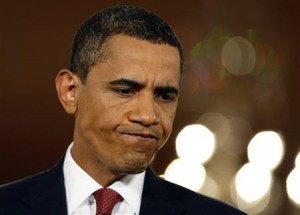 Projecting weakness ultimately ties the hands of the weak leader and pushes him into small thinking and reflexive action.
Projecting weakness ultimately ties the hands of the weak leader and pushes him into small thinking and reflexive action.
I usually stay away from using current polls to gauge how President Obama is doing, because I think the polls will always be skewed in his favor. I think he still has a reservoir of goodwill, and people also tend to give him the benefit of the doubt. This gives him resiliency and a floor of support, no matter how poorly he performs in office.
But the latest New York Times/CBS News poll shows something that is a troublesome sign for the White House. Only 30 percent of Americans believe that the president “cares a lot” about “the needs and problems of people” like themselves. Just two months ago, 38 percent of Americans felt the president cared “a lot.” It’s also a huge drop from the 54 percent of Americans who felt that way shortly after the president took office in 2009. This drop is especially poignant because the question of “who cares about people like me” has always been a particular strength for President Obama.
In fact, in exit polling conducted after the 2012 election, voters picked Mitt Romney over Obama in the key candidate qualities categories of “shares my values,” “is a strong leader,” and “has a vision for the future.” The only category where voters picked Obama over Romney was in the “cares about people like me” category – 81 to 18 percent! Granted, Obama was being compared to Romney, who struggled to connect with voters throughout the 2012 campaign cycle. But the president’s reelection indicates that his ability to make people feel like he cared about them may have been what tipped many undecided voters to give the president another chance.
Despite the president’s attempts to be a champion for middle -class families through his constant stream of self-serving assertions and campaign-style speeches, it seems Americans are beginning to feel like the president isn’t really doing anything to help them. The president isn’t facing the ballot again. But his approval ratings and his near-term policy agenda are still relevant for the Democrats facing the ballot in November 2014.
Rather than be sensitive to their popularity and approval ratings on various issues, it seems like the White House is throwing in the towel and turning to anger. Senior White House Adviser Dan Pfeiffer even compared Republicans to terrorists during a CNN interview. Maybe this approach makes the most partisan Democrats give themselves a pat on the back, but the public doesn’t like it.
It appears from the polls that the White House and Democratic leadership strategy of refusing to negotiate with their fellow Americans on the United States’ critical budget and debt issues is not working. Refusing to negotiate in Washington on domestic issues is never the right approach. Republicans are certainly making their share of mistakes, but the White House seems determined to go out of their way to embrace and engage America’s enemies, such as Russia, Syria and Iran. The president was left pining for a handshake from Iran’s president during the U.N. General Assembly in New York, yet he insults and turns his back on Republican leaders in Washington. Voters notice this, and the Democrats can only hope it won’t impact their potential at the ballot box next year.
. . . . . . . . . . . . . . . .
Ed Rogers is a contributor to the Washington Post, where this article was originally published.